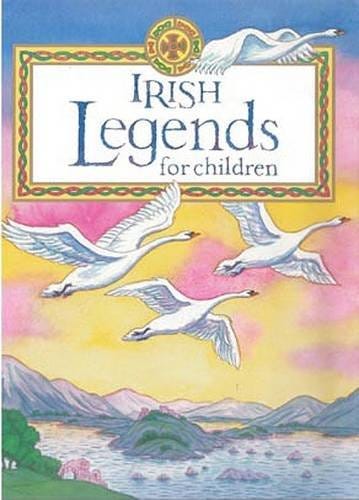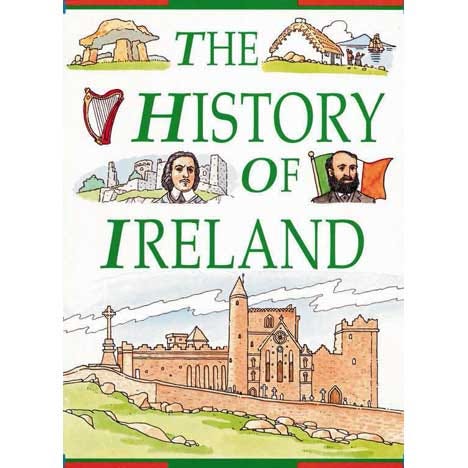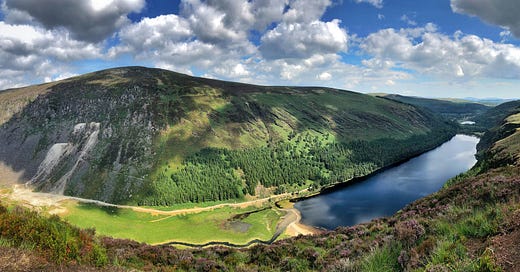On Irishness and Identity
Some thoughts on how I viewed my Irishness growing up to how I want to relate to my Irishness going forward
“Identity” can be a tricky thing. Trickier than something as simple as ‘who you are’ probably should be.
I grew up without any awareness of my own identity. A teenager just before camera phones got good (no ‘selfie’ pressure) I don’t think I even knew what I looked like, or how other people might see me. I just was. Just me. Belinda.
The bit of my ‘Identity’ I did know about though was that I was “Irish” and that meant something when the Rugby was on, or when we did something important before, or better than, England. It was why movies like “The Wind that Shakes the Barley” mattered, and why Irish history was my favourite school subject.
I remember my aunt once pondering what happened to make ‘our generation’ (my cousins and I, all late 1980s/early 90s babies) so ‘Nationalistic’. The fierce patriotism we all displayed, which generally manifested itself in simple-minded teenage ‘Ireland V. England’ rhetoric, was not something she had grown up with. If we weren’t getting it from our parents, where was it coming from, she wondered.
I remember my Monaghan born and raised Presbyterian Granny telling me how she went to Orange Order picnics as a child. It’s a visceral memory because the indignation and absolute outrage I felt at such a revelation burned so strongly through me it left a scar. Armed with my teenage sense of righteousness and fuelled by Junior Cert Irish history lessons on Ireland’s long struggle against colonial oppression and the symbols of it, I immediately launched a counter-attack on poor Granny, ranting at her with my ‘better’ knowledge on why that was just so shocking — so abhorrent! Adding fuel to the fire with an amused twinkle in her eye, “Why do you think I have an orange flower planted outside the house”? she said. Seeing I didn’t get the joke she ended the conversation with:
“Sure, it was only a picnic, what’s the harm in that?”.
What is one person’s picnic is another’s pain. That’s the complexity of national and cultural identity. But no one explains that to you when you’re young and impressionable.
Now, as an Irish person living abroad, that my “Irishness” is a notable part of my identity — in how people identify me — has become even more evident. I am very used to the “Do I detect an Irish accent?” question. I have a well-rehearsed answer that quickly explains my original roots, how I came to be in England/Scotland/Wales and why I stayed (‘Fell in love with an English-man, and all that’. Haha, jolly good) that seems to satisfy whoever asks.
Some would find that a tedious routine. And at times I do. But it’s also made me realise how ‘straightforward’ my cultural identity is. That tilting query of the head that greets my accent so easily answered with a “Yes, I’m Irish — Irish born and bred”. Having such a clear-cut cultural and national identity is a kind of a privilege. Or, at least, it makes satisfying the ‘I need to place you according to some categorising box/label’ requirements of most social situations with strangers much easier to navigate.
Perhaps it was the clear-cut-ness of my Irishness that made me such a patriotic little thing growing up? Why my favourite childhood books were "Irish Legends for Children” and “The History of Ireland”:


As soon as I could read independently, I educated myself into an ‘Irishness’. I absorbed what historian Prof. John M. Regan calls the foundation myth of the Irish state.
“Over five decades after 1960, some Irish historians and political scientists constructed, sometimes knowingly, and at other times unwittingly, a new foundation myth for the Irish state”
John. M Regan “Myth and the Irish State”
Regan argues that the ‘New foundation myth’ was one designed to legitimise the 26-county southern Irish state as a parliamentary democracy. Its sole purpose to replace the much older ‘Republican’ foundation myth which “identified a sovereign Irish nation embracing all of the peoples of the island of Ireland and asserted that, while it remained partitioned from the six Ulster counties beyond its border the southern Irish state remained ‘unfinished business’”. The 1916 Easter Rising was the founding moment of this older ‘republican’ myth, a myth which ‘glorified bloodshed’, deified Rising leaders like Patrick Pearse, and underpinned a separatist (from Britain) republican-nationalism.
Regan notes that while this “old foundation-myth served the southern Irish political establishment well enough until 1970…. events in Northern Ireland…. the advent of the Provisional IRA, and the rapid collapse of Northern Ireland’s political institutions, led some in the south to fear for the stability of the Irish state”. So it was that a new ‘democratic’ myth that legitimised the southern Irish state had to be created. One that had its foundation moment with the establishment of the 26-county Irish Free State in 1922, not the ‘Proclamation of the Irish Republic’ on the steps of the GPO in 1916. Instead of ‘Republicans’ and freedom-fighers like Patrick Pearse, this state had men like Michael Collins — who had died defending its democracy against those (i.e. the Anti-Treatites) who had threatened it— as its heroes. The primary purpose of this ‘New foundation myth’ was to distance Ireland from it’s ‘republican’ past and define the ‘Irish Nation’ according to a 26-county state.
“By marginalising the ‘north’ in the southern imagination, the new story attempted to stabilise the relationship between the Irish population in the south and the twenty-six county state”
John. M Regan “Myth and the Irish State”
Foundation myths are important to the function of any nation. It gives meaning to those living within it and provides a narrative to explain the past and ‘who we are’. Yet, as Regan explains:
“All myths are concerned with extracting a message from the past, and this sometimes involves embellishment. To make foundation-myths potent, for effect they exaggerate and oversimplify. To put it another way, the myth’s narrativity will likely compromise its historicity”.
I was a child of Ireland’s new ‘democratic’ foundation myth. It gave me a fierce pride in being Irish and provided an ‘identity’ I could strongly ‘identify’ with. In that sense, it did it’s job! But it also meant I grew up with a very black-and-white narrative. Instead of developing, the arguably more useful, ability to see and recognise nuance and complexity — to understand the many sides of the story, from different people’s points of view — I look back on the history lessons in school I loved so much, and see now how they centred around educating us into one singular story of the ‘democratic Irish state’.
Yet, this is all just history. The bigger story is how this shapes notions of ‘Irishness’ and ‘Irish identity’ — how foundation myths can be used to legitimise or delegitimise. As several of the women interviewed for the Women of Ireland project have highlighted, these narratives of ‘Irishness’ we have grown up with might be ‘foundational’ but their foundations are weak and its time to question them.
As Molly described, “[I grew up with all that] passion about being Irish and having a national identity…. like I’d have a Michael Collins badge and like, I was ‘Fuck the Brits'. And it was… really just like, it wasn't based on the right things. It wasn't based on the love [of Ireland] it was more so focused on the hate towards the wrongdoings and all that”. But, in recent years she’s come to see all of that through a “whole new lens”, one which has revealed how “that identity and that passion I had was built on the patriarchy”, and has found greater meaning and nourishment in identifying her Irishness with a love and passion for “the land, and the language”, recognising “all those things that are much more important than just being like “It’s one united Ireland” and “like all that shit that I used to be getting so caught up in…. that’s not what it’s about, because that’s just the constructs we’ve come up with in our minds”.
Sonia echoes some of the points in this piece when she highlights how “we've begun to question how Ireland has come up through independence, has formed an identity and a culture that has been — has tried to move us away from being a colony, you know, an English colony to an independent state” and how “that ‘nationalism’ or that 'identity’ “never felt safe. It never felt like inclusive, you know, for females, for Protestants, and now, for, you know, our new immigrants; those that are seeking Ireland as a, you know, a place to call home from elsewhere…. So, I think there's something in the timing now, for Ireland. There is a growing sense that — and maybe we're all reflecting on the 100 years, and the commemoration of Partition — there is as an opportunity to renegotiate, I suppose, for me around, who is included, who now is included?”.
The various foundation myths of the Irish state have, by design, been exclusive — they have been a story of ‘them’ and ‘us’. And, I don’t know about you, but they no longer feel relevant to how I want my ‘Irishness’ to be defined.
What will/could define ‘Irishness’ going forward? I do not know. But what I do know is that, when I look across all the Women of Ireland (which I’ve always defined as women who feel a connection to Ireland not exclusively an “Irish woman”) interviewed for this work, there is one thread that ties them all together; their connection to ‘The Land’ of Ireland. How their ‘Irishness’ is imparted to them in the ‘felt-sense’, the feeling they get, when they are out in nature, in the landscape, experiencing the numinous magic that only the land of Ireland makes them feel — a magic that tells them they are ‘home’.
I am proud to be a person from a land who — as an entity in and of Herself— has the capacity and intelligence to make people feel that way. If only we — at the level of a state and nation — could do the same? Perhaps there’s a better, more inclusive and nourishing, foundation myth yet to be found, waiting to be written, and it probably lies right beneath our feet.





I really loved this. I myself was similar growing up, the knee jerk comments that make me cringe now that show an ignorant nationalism growing up to coming to terms with my own identity.
I’ve never had to consider my identity that much, but we’re moving abroad soon too and it’s in my mind that it will become something I encounter regularly.